Institute for Research on Innovation and Services for Development
Resilience - Innovation - Sustainable Development | Transparency – Organization – Meritocracy
Turismo di lusso: Coviello (Cnr-Iriss), Italia leader nel mondo
March 4th, 2023
Coviello (Cnr-Iriss): «Italia destinazione più gettonata per il turismo di lusso internazionale»
March 4th, 2023
Pubblicato il nuovo report sul comparto ‘luxury tourism’
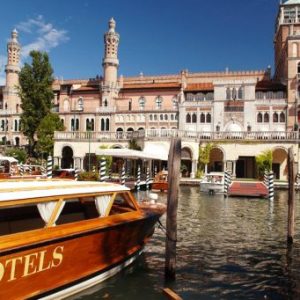
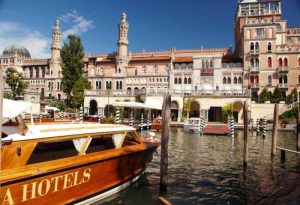 “L’Italia è la destinazione più gettonata nell’anno in corso per turismo di lusso internazionale. Il ‘luxury tourism’ genera il 15% del fatturato totale del settore alberghiero italiano e il 25% della spesa turistica totale (diretta ed indiretta). I turisti internazionali di fascia alta (i c.d. “big spender”), spendono in Italia circa 25 miliardi di euro: 7 miliardi per l’alloggio, 2 per la ristorazione e 14 miliardi di euro per le visite/tour/shopping (Istat-Enit, 2022). Oltre il 45% dei viaggiatori di “fascia alta” è venuto in Italia almeno una volta negli ultimi 5 anni (Enit). Ed il dato è in continua crescita”.
“L’Italia è la destinazione più gettonata nell’anno in corso per turismo di lusso internazionale. Il ‘luxury tourism’ genera il 15% del fatturato totale del settore alberghiero italiano e il 25% della spesa turistica totale (diretta ed indiretta). I turisti internazionali di fascia alta (i c.d. “big spender”), spendono in Italia circa 25 miliardi di euro: 7 miliardi per l’alloggio, 2 per la ristorazione e 14 miliardi di euro per le visite/tour/shopping (Istat-Enit, 2022). Oltre il 45% dei viaggiatori di “fascia alta” è venuto in Italia almeno una volta negli ultimi 5 anni (Enit). Ed il dato è in continua crescita”.
E’ quanto dichiara Antonio Coviello, economista e ricercatore Cnr-Iriss, rendendo noti i dati della sua ultima ricerca sul “Turismo di Lusso” pubblicato all’interno della XXV Edizione del “Rapporto sul Turismo Italiano” (2020-2022), curato da Alessandra Marasco, Giulio Maggiore, Alfonso Morvillo ed Emilio Becheri per Cnr Edizioni in “open access” (consultabile gratuitamente).
“Il turismo di lusso, che riguarda e comprende tutti i comparti della filiera turistica (quali “visiting”, “Food e Beverage”, hotellerie, ecc.), presenta varietà e volumi maggiori di quel che si possa immaginare. Il mercato globale del turismo di lusso è destinato a vivere un periodo di continua crescita e trasformazione senza precedenti nel prossimo futuro, guadagnando oltre 45 miliardi di dollari di valore annuo entro il 2027”.
Il ‘luxury tourism’ si caratterizza per alcune indispensabili caratteristiche: intercettare le preferenze del singolo per offrire un servizio di alto livello e un’esperienza cucita su misura procurando contenuti emozionali e un’esperienza indimenticabile.
“Per il futuro, Bain stima che il mercato dei beni di lusso personali potrebbe raggiungere 360-380 miliardi di euro entro il 2025 con una crescita sostenuta del 6-8% annuo. Di qui il riflesso anche per il settore viaggi, in particolare per il turismo del lusso. La performance del mercato del lusso – continua Coviello – è stata sostenuta dalla ripresa dei consumi locali, dal doppio motore Cina-Stati Uniti e dalla forza dei canali digitali. I clienti più giovani (Gen Y9 e Gen Z10) continuano a trainare la crescita e insieme rappresenteranno il 70% del mercato entro il 2025. Proprio i ‘Millennial’ e la ‘Generazione Z’ (i nati tra il 1980 ed il 2021, ndr) nonostante la giovane età, sono parte attiva del turismo di lusso o influenzano radicalmente le scelte di acquisto di parenti e affini”.
L’interesse dei viaggiatori del lusso è in aumento per esperienze culinarie, crociere, attività all’aria aperta e altre offerte di benessere.
“Benchè le strutture ricettive di lusso siano in Italia presenti a ‘macchia di leopardo’ (a Roma se ne contano circa 60, a Milano 25, a Venezia 24, a Napoli solo 4, contro i 50 della Campania totali, dove località come Ravello, Positano e Sorrento fanno la parte del leone), proprio per il motivo accennato diversi gruppi di ospitalità di lusso hanno adottato nuove misure per rendere le loro offerte versatili e allettanti per i consumatori”, spiega il ricercatore del Cnr.
I viaggiatori durante il corso di questa interminabile pandemia cercano di volare di meno, ma cercando di rimanere più a lungo durante i viaggi. Infatti, stiamo assistendo a una maggiore domanda di viaggi “lenti”, in cui le persone rallentano e visitano un solo posto, prendendosi il tempo per familiarizzare con la destinazione, i suoi dintorni e la cultura, piuttosto che fare una visita fugace.
“Le prenotazioni di jet privati sono aumentate e sempre più resort privati dell’isola offrono l’opportunità agli ospiti di fare un ulteriore passo avanti affittando l’intera isola, con le persone che scelgono di viaggiare esclusivamente nelle loro bolle sociali o per viaggi più significativi con le persone a loro più vicine”, come si recita nella ricerca.
“Nel corso degli ultimi mesi, infatti, c’è stata una rinnovata attenzione alla salute del corpo, della mente e dell’anima, mantenendo l’attenzione su salute e benessere”.
La crescita della spesa nel turismo di lusso è, storicamente, direttamente proporzionale a quella per beni di lusso. In un contesto generale che vede i consumatori di beni e viaggi di lusso europei cauti nei confronti della spesa domestica, si prevede che sia i consumatori americani che quelli cinesi supereranno le stime pre-pandemia in termini di incidenza.
“Nello specifico – spiega l’economista partenopeo, autore della ricerca – per gli americani ci si aspetta un incremento rispetto alle cifre pre-covid di +2-3 p.p., con una rilevanza prevista tra il 19 ed il 21% al 2025. Per i cinesi, l’accelerazione rispetto a quanto stimato prima dello scoppio della pandemia è stata quantificata in +3-4 p.p., con un’incidenza che si prevede si attesterà intorno al 43-45% nel 2025 (BCG 2021).
In seguito ai problemi generati dalla pandemia, il mercato globale dei viaggi di lusso si sta gradualmente riprendendo e si stima ritornerà ai livelli pre-Covid entro la fine dell’anno 2022. Un trend positivo nel lungo periodo con una ulteriore crescita stimata del 2-3% da oggi al 2025.
“Made in Italy” e viaggi di lusso saranno sempre più intrecciati, infatti, considerando anche che la propensione al lusso è maggiore per gli stranieri che visitano il nostro Paese rispetto agli italiani. Il Made in Italy, inoltre, si identifica con forme di fruizione di qualità ma accessibile.
“Fare sistema” è l’imperativo per le aziende italiane del lusso, perché c’è sempre più compenetrazione tra settori diversi, dall’automotive al food, e “alleanze, collaborazioni e co-branding sprigionano spesso un’energia positiva”, ma anche per proteggere asset preziosi come il saper fare artigianale e il legame con i territori per difendere un comparto che vale il 7,4% del PIL italiano.
“Il Turismo di Lusso” https://publications.cnr.it/doc/476927 in XXV Edizione del “Rapporto sul Turismo Italiano” 2020-2022, CNR Edizioni (in Open Access, scaricabile gratuitamente) https://www.iriss.cnr.it/rapporto-sul-turismo-italiano/xxv-edizione-2020-2022-del-rapporto-sul-turismo-italiano/
Per informazioni:
Antonio Coviello
CNR – Istituto di Ricerca su Innovazione e Servizi per lo Sviluppo
Via G.Sanfelice n.8 – Napoli
a.coviello@iriss.cnr.it
0812470942
Ufficio stampa:
Antonio Coviello
IRISS-CNR
a.coviello@iriss.cnr.it
0812470942
3356547171
Vedi anche:
March 4th, 2023
Terremoto: quali le conseguenze economiche e assicurative?
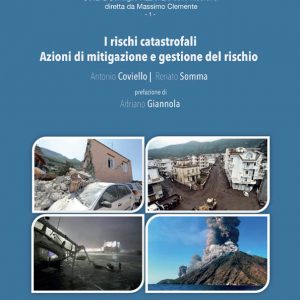
Il recente terremoto in Siria e Turchia ha riportato al centro dell’attenzione il tema delle perdite economiche dovute ai sismi: sulla questione è intervenuto il ricercatore dell’Istituto di ricerche su innovazione e servizi per lo sviluppo (Iriss) del Cnr Antonio Coviello.
“Le perdite economiche totali dovute al duplice terremoto in Turchia sono stimate intorno ai 20 miliardi di dollari. Le perdite del settore assicurativo e riassicurativo sono calcolate in circa 2,5 miliardi di dollari (limite massimo stabilito dal pool assicurativo-pubblico), solo perché in questo esiste Paese esiste un sistema assicurativo obbligatorio misto pubblico-privato per le case residenziali a protezione di tali eventi (e non le perdite umane), che ha visto circa 50 mila edifici rasi al suolo. Dobbiamo fare tesoro di questo tragico evento al fine di prevenire e mitigare effetti devastanti per l’Italia, paese ad alto rischio”.
Coviello ha pubblicato da poco il suo ultimo volume dal titolo “I rischi catastrofali. Azioni di mitigazione e gestione del rischio” edito da Cnr Edizioni in ‘open access’, scritto unitamente a Renato Somma, ricercatore INGV e associato Cnr-Iriss, al quale hanno contribuito esperti e ricercatori italiani di varie afferenze e competenze, la cui prefazione è firmata da Adriano Giannola, presidente Svimez.
“L’Italia ha il più grande gap di protezione di tutti i Paesi europei, nonostante abbia subìto danni per le calamità naturali per 51,8 miliardi di dollari dal 2011 al 2021. La fiscalità d’emergenza non può più reggere. Occorre anche nel nostro Paese trovare una soluzione al problema dei risarcimenti. Necessaria, pertanto, una capacità del sistema molto elevata”.
“Negli ultimi 40 anni i disastri naturali in Italia sono aumentati: più di due terzi delle abitazioni italiane è a rischio medio-alto di terremoti o alluvioni. I costi delle calamità naturali arrivano fino al 3% circa del Pil annuo, fenomeno diffuso ormai a livello mondiale. Il 10% circa dei comuni italiani ha subito danni causati da calamità naturali negli ultimi due anni, per un costo complessivo pari allo 0,2% del Prodotto interno lordo”, ha chiosato il ricercatore.
Per informazioni:
Antonio Coviello
Cnr – Iriss
a.coviello@iriss.cnr.it
Vedi anche:
February 28th, 2023
Un piano per la gestione sostenibile dei rifiuti in Mongolia: il progetto 3R4UB a “Buongiorno Regione”
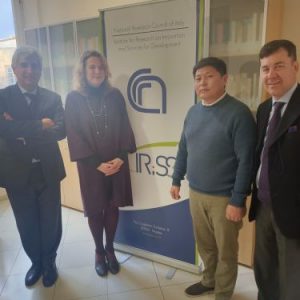
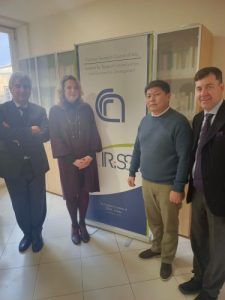
Il Ministro della Giustizia mongolo in visita al Cnr Iriss
Mercoledì 22 febbraio 2023, la trasmissione “Buongiorno Regione” ha dedicato un servizio al progetto di cooperazione internazionale 3R4UB – “The 3Rs for a sustainable use of resources in Ulaan Bator” (dal min. 22 al min. 26 circa), finanziato dall’Unione Europea nell’ambito del programma SWITCH-Asia and Central Asia II – Promoting Sustainable Consumption and Production, coordinato dall’Istituto di ricerca su innovazione e servizi per lo sviluppo (Cnr-Iriss). Oltre all’Istituto Cnr, il progetto vede impegnati la società in house del Comune di Cava de’ Tirreni, Metellia Servizi, e per la Mongolia la Municipalità di Ulaanbaatar e l’Agenzia del Ministero dell’Ambiente mongolo Fresh Water Resources and Nature Conservation Centre (FWRNCC).
Obiettivo del progetto, finanziato con un budget di 3.5milioni di euro, è di supportare i Partner mongoli nell’elaborazione partecipata di un masterplan per la gestione dei rifiuti solidi urbani orientato alla riduzione, riutilizzo e riciclo dei rifiuti, nel rispetto dei principi dell’economia circolare. Dal 29 gennaio all’8 febbraio una delegazione composta da 14 partecipanti, tra cui tecnici della Municipalità di Ulaanbaatar, rappresentanti dell’Agenzia del Ministero dell’Ambiente mongolo Fresh Water FWRNCC e dell’imprenditoria locale interessati allo sviluppo dell’impiantistica ha effettuato una missione in Campania per visionare l’impiantistica locale per la gestione dei rifiuti. Tra le visite effettuate, quella al Termovalorizzatore di Acerra – Gruppo A2A. L’impianto, in servizio dal 2010, tratta la frazione non differenziata della regione Campania: oltre 700.000 tonnellate di rifiuto all’anno, producendo oltre 600.000 MWh che corrispondono al fabbisogno di oltre 200.000 famiglie.
Attraverso il progetto 3R4UB, il Cnr-Iriss prosegue il suo impegno nella cooperazione internazionale con l’obiettivo di trasferire know-how interdisciplinare e sviluppare processi di crescita collaborativa con le comunità e i territori di Paesi lontani e di diversa cultura. Fabrizio Canonico del Cnr-Iriss ha dichiarato: “Il ruolo del Cnr è di fornire assistenza tecnica, di ricerca, scientifica soprattutto nella pianificazione di uno strumento che possa guidare la città di Ulaanbaatar nella pianificazione per i prossimi venti anni nell’ambito del ciclo integrato dei rifiuti”.
In continuità con le attività progettuali e all’insegna di un’ampia e proficua collaborazione con le Istituzioni mongole, il Direttore del Cnr-Iriss ha ricevuto ieri la visita del Ministro della Giustizia mongolo.
February 22nd, 2023
Gaia Daldanise del Cnr-Iriss nominata coordinatrice territoriale dell’Ontm per la Città Metropolitana di Napoli

Gaia Daldanise, assegnista di ricerca presso l’Istituto di ricerca su innovazione e servizi per lo sviluppo del Consiglio nazionale delle ricerche (Cnr-Iriss), è stata nominata coordinatrice territoriale dell’Osservatorio nazionale per la tutela del mare (Ontm) per la Città Metropolitana di Napoli. Dottore di ricerca in “Urbanistica e valutazione”, tra i suoi interessi di ricerca rientrano l’urbanistica collaborativa, la co-valutazione e i processi di ricerca-azione con particolare riferimento ai processi decisionali collaborativi per la rigenerazione urbana nelle aree costiere e nelle città-porto. Svolge attività di ricerca con il Dipartimento di Architettura (DiARC) dell’Università degli studi di Napoli Federico II, collaborando con il Master in progettazione e pianificazione sostenibile delle aree portuali.
L’ontm ha come obiettivo principale la divulgazione della cultura del rispetto ambientale e della conservazione del territorio, con particolare riferimento all’ambiente marino e a tutto l’ecosistema che lo circonda. La tutela, promozione e valorizzazione dell’ecosistema marino e del mare sono perseguiti attraverso una seria e concreta attività di innovazione e ricerca scientifica e tecnologica, che si sviluppa anche grazie alle competenze raccolte all’interno dell’Innovation Hub, e di divulgazione della cultura ambientale e dello sviluppo sostenibile attraverso i referenti territoriali dell’Osservatorio.
Per informazioni:
Gaia Daldanise
Cnr-Iriss
g.daldanise@iriss.cnr.it
Vedi anche:
February 15th, 2023
La metagenomica comparativa per indagare i sistemi idrotermali della Solfatara e di Pisciarelli
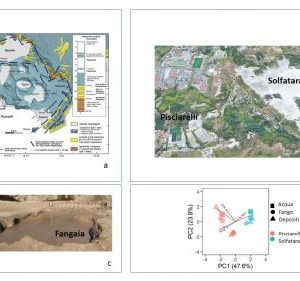
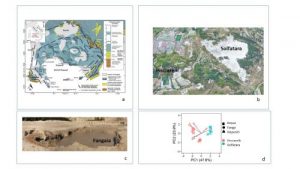
a) Campi Flegrei carta vulcanologica – b) Solfatara e Pisciarelli Google Maps c) Fangaia Interno Solfatara d) Diagramma basato sull’analisi delle componenti principali (PCA) utilizzando temperatura, pH, Eh, anioni e cationi solubili in acqua
Ricercatori italiani del Cnr (Istituti Iriss e Ino) e dell’Ingv, assieme a colleghi di istituti di ricerca e università americane (Department of Earth and Environmental Sciences, Rutgers University; EDGE Institute, University of California, Riverside, Riverside, Earth and Planets Laboratory, Carnegie Institution for Science), hanno condotto uno studio ai Campi Flegrei nel vulcano della Solfatara e nell’area di degassamento diffuso di Pisciarelli, mostrando che – nonostante le due località abbiano litologie simili- presentano una geochimica dei fluidi distinti.
Lo studio è pubblicato sulla rivista Frontiers in Microbiology: “Sono stati utilizzati i metagenomi nel contesto della loro geochimica ambientale per indagare l’ecologia di diversi substrati (acqua, fango e depositi fumarolici) della Solfatara e di Pisciarelli”, afferma Renato Somma, associato presso il Cnr-Iriss e ricercatore della Sezione di Napoli dell’Ingv. “In particolare, tutti i substrati della Solfatara hanno evidenziato una chimica simile, mentre i substrati dell’area di degassamento di Pisciarelli mostrano una chimica variabile, con l’acqua e il fango delle pozze gorgoglianti che presentano alte concentrazioni di SO42– e NH4+. Lo studio statistico non ha mostrato una significativa diversità tra le due località (Solfatara e Pisciarelli), ma non ha mostrato differenze significative tra i substrati (acque, fango e substrato) in ciascun sito studiato evidenziando inoltre che il pH è risultato il fattore più importante della diversità della composizione della comunità microbica.
La composizione geochimica dell’acqua e del fango della pozza di Pisciarelli è differente dai depositi fumarolici, dal fango del canale di scarico e dal fango della piccola pozza di Pisciarelli. Tuttavia, sulla base delle comunità microbiche, tutti i campioni di acqua e fango si sono raggruppati in modo distinto dai depositi fumarolici, che erano i substrati più secchi analizzati. I risultati hanno mostrato che i depositi fumarolici di Pisciarelli erano più simili ai campioni di Solfatara rispetto ai campioni delle pozze di fango di Pisciarelli.
Nel complesso, il genere Acidianus dominava l’acqua di Pisciarelli e Pyrobaculum era più abbondante nel fango di Pisciarelli. È interessante notare che i depositi fumarolici di Pisciarelli, lo strato microbico epilitico e il fango della piccola pozza di fango presentavano un elevato numero di sequenze virali. Solfatara e Pisciarelli presentavano comunità microbiche distinte; in media, Acidianus e Pyrobaculum dominavano Pisciarelli mentre Sulfobacillus e Acidibacillus erano dominanti alla Solfatara.
Le analisi geochimiche e metagenomiche comparative dimostrano che le differenze ecologiche tra i substrati non sono un fenomeno diffuso ma specifico del sistema. Pertanto, questo studio dimostra l’importanza di analizzare diversi substrati dei CHS per comprendere l’intera gamma dell’ecologia microbica ed evitare valutazioni ecologiche errate, conclude Somma.
Per informazioni:
Renato Somma
Cnr-Iriss
Via Diocleziano Guglielmo San Felice 8 Napoli
renato.somma@ingv.it
3440640873
Vedi anche:
- Pubblicazione
- Comparative metagenomics at Solfatara and Pisciarelli hydrothermal systems in Italy reveal that ecological differences across substrates are not ubiquitous
February 2nd, 2023
Bando Borsa di Studio 1/2022
PUBBLICA SELEZIONE PER IL CONFERIMENTO DI N.1 BORSA DI STUDIO PER LAUREATI PER RICERCHE NEL CAMPO DELL’AREA SCIENTIFICA “INGEGNERIA ED ARCHITETTURA” DA USUFRUIRSI PRESSO L’ISTITUTO DI RICERCA SU INNOVAZIONE E SERVIZI PER LO SVILUPPO DEL CNR DI NAPOLI NELL’AMBITO DEL PROGETTO DUS.AD019.004 DAL TITOLO “SUPERBIOCER (SUPER COMUNITÀ ENERGETICA RINNOVABILE BASATA SULLO SFRUTTAMENTO DELLE BIOMASSE)” CON COMMITTENTE: COMUNITÀ MONTANA BUSSENTO – LAMBRO E MINGARDO. (CUP F17G22000200005).
December 16th, 2022
Superbonus, Acen: “Servono norme certe e stabili”
December 5th, 2022
Superbonus, l’appello dell’Acen: servono norme certe e stabili
December 5th, 2022
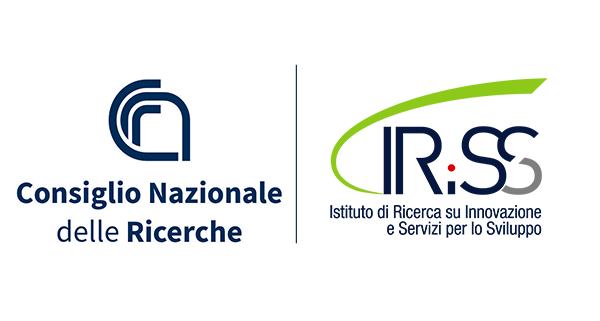
You must be logged in to post a comment.